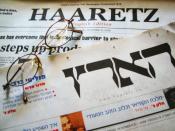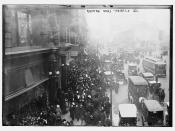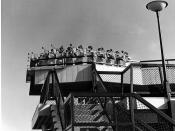Media Reaction Paperâ¢Cowell, Alan. "Subway and Bus Blasts in London Killat Least 37." New York Times on the Web July 8, 2005 â¢Benn, Aluf & Yossi Melman & Roni Singer. "PM: Don't Equate U.K. Attacks with Terror Here." Haaretz on the Web July 8, 2005 â¢Settle, Michael. "Al Qaeda's London Carnage." The Herald on the Web July 8, 2005 The media reaction paper assignment has given me significant insight into the media world. It is well-known that the media is clearly not an unbiased body, but the assignment highlighted many different aspects of this fact. More specifically, by examining stories covering the London Bombings in July 2005, one can plainly see not only the biases of the different newspapers, but also the very different cultures that they cater for.
Even from the headlines, the differences between the three papers, the New York Times, The Herald and Haaretz, are clear.
Each newspaper addresses very different people. The Herald addresses the people who are themselves living through the traumatic incident and therefore appeals to their fears and biases with emotive words such as "carnage" to describe the incident. While Haaretz, which caters mostly to Israeli immigrants, relates the incident to Israeli issues and the headline plainly shows the papers bias that the attacks are not comparable with terror in Israel.
The Herald, which caters to the people who have been directly affected by the bombings, is the most emotive of the articles. It uses adjectives (such as "four huge bombs"), hardly ever used in informative newspaper reports, which illustrate their bias against Al Qaeda. The New York Times and Haaretz reports do not appear to be that different from The Herald's report. They report the same facts, but they clearly cater to different cultures. Both the New...


